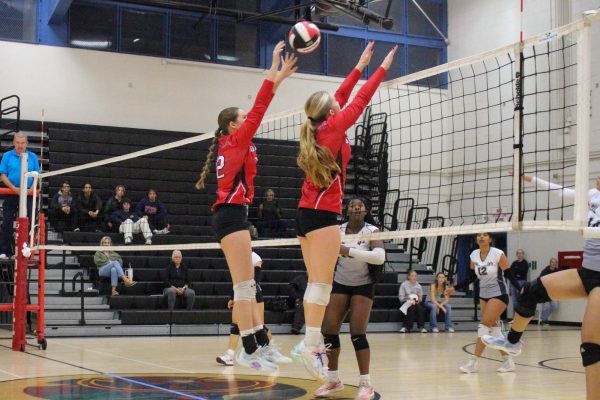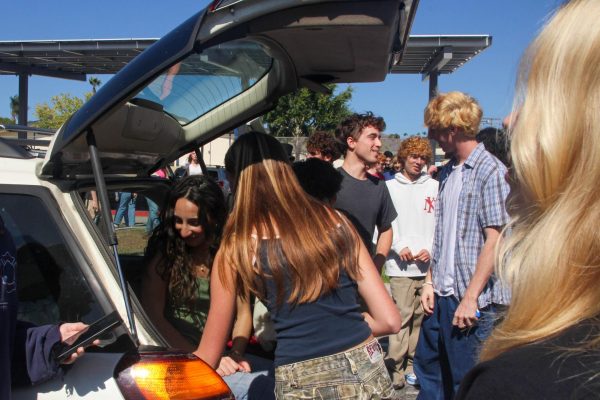Opinion: What Every Foothill Freshman Needs to Know
Although high school can seem scary and confusing to a freshman, experienced seniors can offer their advice.
October 23, 2019
As my time at Foothill dwindles and I’ve begun the delightful experience of trying to stand out as a “memorable candidate” on college applications, I’ve come to realize a few important things.
Though valid, the typical “stay on top of your work” or “get enough sleep” advice becomes repetitive and redundant. Hopefully we all know that procrastinating is a no-no and that staying up until 1 AM watching YouTube every night is also not such a hot idea.
I’ve compiled a list of advice that I wish was available to me my freshman or sophomore year. Although Foothill has an excellent record pertaining to students’ college preparedness, we really need to start giving freshman the inside scoop to set them up to not only succeed in Foothills unique environment, but also to enjoy it.
Participate in Class and Get to Know Your Teachers
As tempting as it may be to sit in the back of the class and play the Snake game on your Chromebook while half listening to the lesson, try to resist. Participate in class discussions and get to know your teachers.
When senior year (I know it seems far away, but time flies) rolls around and you have to ask for a couple of letters of recommendation, you’ll want to have one or two teachers who would be comfortable vouching for your character, growth and academic abilities.
Know thyself!
Although it’s cliche, no one knows you better than you know yourself. If academia or school in general is the bane of your existence and the source of your eternal misery, please don’t go to college because you feel like you “have to” or because it’s what your parents want. By figuring out which path is best for you early on, you’ll save yourself a lot of hardship. Be open to alternative options like trade school or entering the workforce after high school.
One of the glaring faults in our education system is that it’s peddled that you can’t be successful if you don’t go to college. This of course is a lie straight from the depths of hell.
Figure Out How You Learn Early on
The faster you figure this out about yourself, the quicker you’ll be able to maximize your efficiency when it comes to learning and retaining new material. Some people learn best by absorbing information visually, some auditorily, and some by writing the information out. By testing out each method and deducing which one is optimal, you’ll be able to start studying “smarter not harder.”
Get Involved in a Few Solid Extracurriculars/ Clubs you Enjoy
Although it may be tempting, joining 15 clubs probably isn’t the best idea. Join one or two clubs or activities you enjoy and stick with them all 4 years if you can. If you decide to go the college route, on applications most schools are looking for quality over quantity. It’s better to be committed to a few activities or clubs where you’ve made a real impact or held a leadership role in comparison to being a short-term member of many organizations.
Yes, Your Freshman Grades Count
I’m unsure of the origin of this misinformation, but at least once during your first year of high school you’re bound to hear that “colleges only look at your sophomore and junior year”. Although it’s partially true that most schools give particular credence to your sophomore and junior year as a representation of your “college readiness,” your entire high school transcript is judged holistically.
Also, your cumulative GPA that many colleges use as an admission factor reflects your grades from the beginning of 9th grade to the end of 12th. UCs and CSUs only use sophomore and junior year grades in their own GPA calculations, but consider the overall rigor of courses taken all four years.
Cultivate Your Study Habits/ Work Ethic Early
I cannot stress this point enough. Good time management is undeniably one of the most important skills you will ever learn. Being able to prioritize and budget your time appropriately between all your classes is difficult and will take time to master. As your classes gradually become more rigorous, you will likely come to rely heavily on your ability to buckle down and take care of your business, particularly during finals or AP testing.
For large assignments or readings I’d recommend a divide and conquer approach. Determine how many days you have to complete the assignment, then chip away at it for 20 minutes a day. Also, if flashcards help you learn, I’d highly recommend the mobile app “Flashcards+” by Chegg. It’s a lifesaver.
Don’t Procrastinate on Your Community Service Hours
Although becoming a leader in the F.I.R.E (Foothill Intervention, Reinforcement, Enrichment) program your junior or senior year is a great option for getting 70-80 community service hours, you shouldn’t solely depend on it. There is an application process and not everyone who applies will be accepted. By approximately the middle of your senior year you’ll need a minimum of 60 hours total from at least two different organizations. Don’t wait, be kind to your future self!
If you know you’re going to VC…
Around half of Foothill’s graduating senior class will continue their education across the street at Ventura College. This is unsurprising, as attending most 4-year universities is egregiously expensive and is generally not economically feasible for most families. If you know you’ll be going to Ventura College after high school, that’s not your queue to breeze through Foothill putting in as little effort as possible.
Consider taking advantage of the 13 Advanced Placement courses offered at Foothill. Although AP classes may seem reserved for 4-year bound student looking to woo universities, this isn’t necessarily the case. By passing an AP test with a score of 3 (on a scale of 5) you’ll get credit towards your general education that can help you to transfer from community college quickly.















